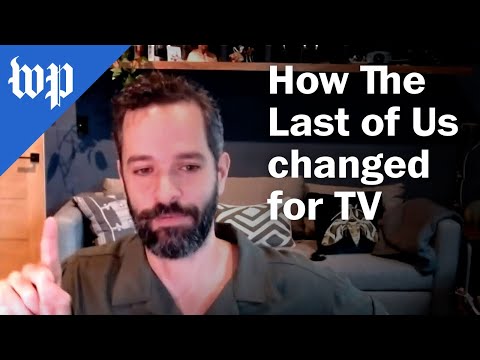
HBO show changes for The Last of Us | Neil Druckmann Interview
– People do their best work when they’re passionate about what it is that they’re making. If that wasn’t the case, I’d be working on “Crash Bandicoot 17” right now. We decided to take a risk. Like, let’s do our first M-rated game. That risk led to the “The Last of Us.” I did not think it was gonna be that successful. I thought some of it was too subtle and nuanced, and I just didn’t think it would work as well, but it did. Again, I think a big part of it is because we were working on something
that the entire studio was really passionate about. – Washington Post Live and Launcher’s Gene Park interviewed Naughty Dog’s co-president Neil Druckmann, who worked on both “The Last of Us” video game and its HBO show iteration. Druckmann discussed the changes made to the story from the game to the HBO show, and what it was like to experience this universe from an entirely different medium and perspective. – You know, it’s been two years since “The Last of Us Part II” came out, and 10 years since “The Last of Us Part I” came out. – When you say
it like that, I just feel old. I remember the moment we first started talking about “The Last of Us” at Naughty Dog. We were talking about
feeling of love. And to me, “The Last of Us” has always been an exploration of that. Some of the best storytelling sometimes in passive media, in TV, in film, is scenes that don’t have any dialogue, and it is just about reading a person’s expression. One of the changes that we made for the TV show is, we made Sam deaf. It started from a place of just conversations I had with Craig, where like, “What if we could use less dialogue?” But then that kind of constraint led to really interesting storytelling decisions that I would say, in
some ways, make that sequence more impactful than it is in the game. – Was it liberating for you to work on these same characters, but like, being able to work on them on the show? Because in the game, you have to really stick with Joel and Ellie’s perspective. They are the player, right? But now with the show, you can actually move the camera around and move the plot around and focus on other characters. How was that process for you? – It was kind of thrilling. You know, in trying to build the world, you often write
and define more than what the player’s going to experience, so they don’t see the edges. You want to define much further than what the player sees so again, they don’t feel like the world ends where their experience ends. With the show, you are not Joel. You are not Ellie. We get to see these really kind of interesting perspective that speak to that theme of love and the wonderful things that can come of it and the horrible things that can come of it. And in a way, it can strengthen the journey that Joel and Ellie go
through. So, for example, when they crash their truck and they go against the “hunters,” we get to humanize what is an obstacle for them. But therefore, I think their conflict becomes that much greater, because you realize they’re fighting against people that are also trying to survive, that are also trying to find their way in this world. They’re not just henchmen. Ultimately, we are all people. It’s just, there’s something, some motivation — something is putting us at odds. And then that exploration of like, okay, how do we resolve this conflict? To me, that’s often the juiciest
part of the story. – You talk about the world we live in. “The Last of Us” is very obviously about a post-pandemic world. Some critics of this game and its story say that it was unusually dark and very cynical, has a very dim view of the human spirit. But I know for myself, over the last two years, in the now and still very real pandemic world, I think reality has only reinforced some of those aspects of the game. How has the last two years changed your perspective, if at all, of the original vision, and how
did this inform how you approached some of the new changes in the show? – The game and the show are really not about a pandemic. There’s one episode that’s about a pandemic. Everything else is what happens afterwards, and likewise, the first 15 minutes of the game are about a pandemic. Everything else is about what happens afterwards. It’s about relationships and people. When I was starting out, I used to be, I think, a lot more naive and think, “Oh, man, we’re gonna make these games that will change the world and affect a bunch of people.” I’m
more interested now, I think, in affecting a few people deeply and inspiring people, mentor the next generation of creators. I get, I think, more so now a feeling of pride of seeing other people kind of rise through the ranks and leave their mark on the industry. – To watch the full Washington Post Live interview or read Gene Park’s review of the HBO series, click on the links in the description below.
